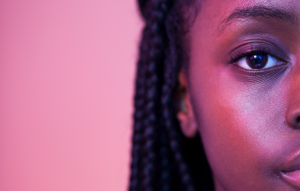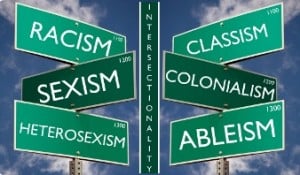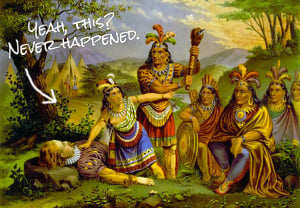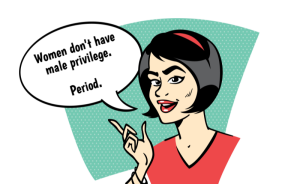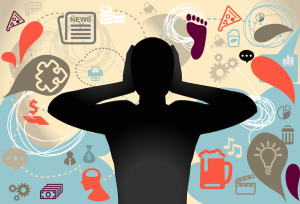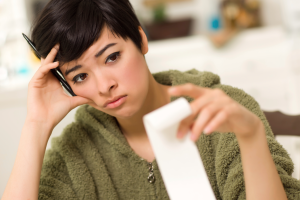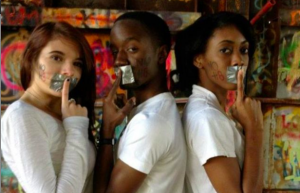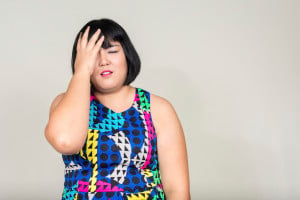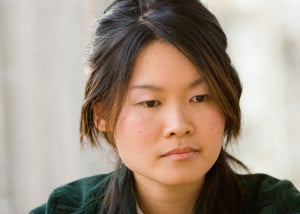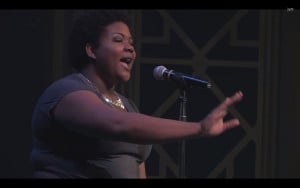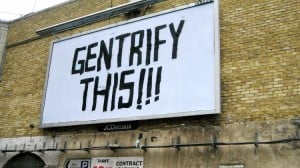In the present movement for Black lives, I’ve encountered many white people who have expressed negative, resentful, and antagonistic feelings about the unapologetic ways Black folks resist and lift themselves up.
It seems, at times, as if the most “well-intentioned,” or what you might call “liberal,” of white people poignantly proclaim that #AllLivesMatter before even attempting to mutter the words #BlackLivesMatter – much less consider the very intentional relevance of that statement.
These feelings are nothing new – in fact, white people centering whiteness have historically existed throughout Black resistance movements.
Blackness, in this society, is seen as threatening and movements that uplift Black people are certainly not exempt from that perceived threat.
Whether it looks like Dr. Martin Luther King Jr. declaring a dream, Malcolm X telling Black people to love the Black skin they’re in, the Black Panther Party feeding children breakfast before school, or James Brown telling us to “Say it loud: I’m Black and I’m proud.”
Loving Blackness, lifting up Blackness, and asserting Black Power can be frightening for a lot of white folks who just don’t understand, who refuse to understand.
As a result, those who find themselves in the fight for Black liberation are often told by threatened white folks that because we are “pro-Black,” we must be “anti-white.”
We are often called reverse racists and bigots. I’ve even personally had white family members who talk about my work behind my back – family members who are upset and assume that I hate them because they are white.
The media, law and government are just a few forces that have historically perpetuated this belief, and still do to this day.
Although many draw on Dr. Martin Luther King Jr. today as a hero and legacy in the civil rights movement, during his time as a leader in the 1960s, he was often positioned as a dangerous and threatening revolutionary.
He was frequently arrested and constantly surveilled by the United States FBI. His political relationships and resistance to the United States system of oppression came with consequences of constant threats to his life, suffering, and eventually his assassination.
This is how the media and legal/political system worked together to teach white America that Black liberation was anti-white.
They worked to create a false sense of threat in white America, when it was in fact white America that was the most violent and threatening towards the oppressed.
The real threat to white America was not any Black revolutionary. The real threat was that they would lose a tremendous amount of their own privilege if they afforded Blacks with equal treatment and access to wealth, resources and livelihood.
For those struggling with these concepts, here are four reasons why being Pro Black is not the same as being anti-white.
1. I Don’t Have to Hate White People in Order to Love My Blackness
I can only speak from my personal lived experience, and my lived experience is that of a mixed race kid who has culturally identified as Black his entire life.
I grew up in a predominately Black and Latino neighborhood and surrounding community in PG County, Maryland. The schools I attended were majority Black and Latino, and my friends were mostly Black.
Most days, you could find us at the carryout ordering chicken and french fries with mumbo sauce. We went to “the gogo” and some of us had our own gogo bands (you haven’t experienced life until you’ve experienced gogo in DC – you can Google Chuck Brown, Backyard Band, or even Wale for reference).
We used to hang out on the steps at Gallery Place in DC and every chance we got, we would takeover Dupont Circle for a night of Pride with other Black queer youth.
Growing up in PG County let me experience Black people in so many shapes and variations that I never had to go looking for Blackness and I never assumed it looked one particular way.
My family and cultural traditions tie mostly to my dad’s side – where we would all get together for family reunions in Walstonburg, North Carolina every year, hoping to be first in line for my Aunt Tote’s cheese biscuits.
Where (when I finally got “grown enough”) I would sit at the spades table with my uncles and older cousins with a heavy heaping of Crown Royal and shit talking.
Where I was raised in the Black Baptist tradition (and as traumatizing as many of us know the “Black church” can be, we know it also always felt like home).
Where I heard for years and years how my family once used to own land but lost it as a debt to white men.
All of these things were a part of what made up my Blackness.
The fact that I had a white mother didn’t change anything about that, nor did it change how much I lived and loved every part of these unique experiences.
As a child, I didn’t feel the need to say out loud how much I loved Blackness, because I simply lived it and most times I was accustomed to the violence Black folks were facing on a regular basis that it made me unaware of it in a way.
I was always around it, but I couldn’t always see or name it for what it was; it was just something that was always around us.
In fact, I know that because I had a white mother and lighter skin, I was even protected from that violence in some ways.
Now that my vision is more clear, I proclaim loudly my love for Blackness and Black people because I see the revolution in doing so.
But that has never meant that I had to hate my own whiteness or white people in exchange.
You see, loving Blackness is more autonomous than a lot of people think or understand.
When we love Blackness, it has nothing to do with white people. When we experience our Blackness, we are not thinking anything about white people in those spaces.
The only time this may have an exception is when we have encountered an experience of racism and need to vent about it amongst friends, lovers, or relatives.
Even then, this never manifests into beliefs of being anti-white, but of feeling a deep harm from systems that continually reminds us that it hates Black people.
How we love ourselves and other Black people, when authentic, has nothing to do with hating white people.
2. The War on Black People Is Deeply Intersectional
Violence against Black people in this country and around the world doesn’t just look like white-Black racism.
Most times, folks have this very narrow view of what racism looks like, but in reality, racism for Black folks also includes racialized versions of sexism, ableism, colorism, classism, internationalism, heterosexism, and so on.
All of this creates a unique lived experience for us.
Our struggle does not look just one way and we are not so simple as to think that hating white people is the base for how to solve our oppressions.
As Stereo Williams most recently and brilliantly wrote,
When discussing racial issues, we cannot pretend that all bigotry is equal. It renders the discussion empty to reduce it to personal meanness or problematic individuals. This kind of retort is a tactic meant to purposely obscure the points that I make regarding white supremacy in American culture.”
What I hate is knowing that Black people across the nation are being murdered at a rate of every eight hours by police, security guards or vigilantes.
What I hate is knowing that Twitter employs just 14 Black women out of 3,000 employees (that equates to 0%).
What I hate is watching the Black population in San Francisco decline below 5% because tech money and violent gentrification cause significant rent increases, evictions, and displacement.
What I hate is knowing Black trans women have a life expectancy of 35 and at least twenty trans women (that we know of) have been murdered in 2015 – most of them were Black – yet we hardly know their names like we know Mike Brown’s or Trayvon Martin’s.
What I hate is watching the ways Black youth are criminalized, demoralized and made perpetual victims of the school-to-prison pipeline.
What I hate is knowing that after 400 years of Black people existing, laboring, surviving and thriving in this country, it wasn’t until 2015 did Viola Davis become the first Black woman to win an Emmy for best actress in a drama.
What I hate is that once white people learned that none of the main protagonists in the new Star Wars film were white men, they went and created the hashtag #BoycottStarWarsVII to say the film promotes white genocide.
If I were to adapt a hatred for all white people, that would mean that I’ve adopted a value of universalizing all white people, their experiences, and the ways they benefit from a system that is entirely too complex for generalizations and universalities.
That would mean that I’ve made vast generalizations about both white and Black people, and that I do not critically evaluate and engage the systems and many levels of suffering we are under.
These systems, while they do prioritize white people under the value of white supremacy, they do not only benefit white people and they do not only benefit white people in one way.
3. White Supremacy Manifests in Insidious and Interpersonal Ways
When you take offense to a #BlackLivesMatter protest because you believe they should be saying #AllLivesMatter (or even #WhiteLivesMatter) or when you take a direct offense to someone being “Pro-Black,” it is presumptuous and telling of many things.
First, it reveals the reinforcement of the white-Black binary assumption – that is, if we are saying we are Pro-Black, that must mean we are anti-white.
But what about everyone else?
While anti-Blackness certainly fuels white supremacy, this is a direct erasure of those who exist outside of the white-Black “racial binary” and it also does not address how colorism perpetuates harm and anti-Blackness even in communities of color.
When you assume that pro-Black = anti-white, you have successfully assumed that the person is attacking or talking about you, when in fact they are more likely talking about an entire constructed system.
This consistent need to re-center yourself in the narrative shows that you may have internalized white supremacy and must take up space in a conversation that was never a personal attack on you.
Think about it.
If I started a campaign for breast cancer awareness, would you then show up protesting the events because I did not talk about pancreatic or liver cancer? The answer is likely no.
The reasons we say #BlackLivesMatter are not to say that only Black Lives Matter, but to say that we acknowledge the disproportionate violence Black folks experience that all lives do not have to.
I have some family members who have seen my work and love for my community as a direct correlation to hating white people and “reverse racism.“
They fail to recognize that what I hate are the racist, white supremacist systems that I have personally been impacted by and that my community has been impacted by – both institutionally and interpersonally.
If you’re equating a disdain of systemic oppression to a hatred for an entire group of people then you are not only blind, but incredibly selfish and guilty.
And that’s exactly how interpersonal white supremacy manifests itself.
4. It’s Okay to Be Pro-Black in a World That’s Anti-Black
Because if we don’t take the time to value, empower and love up on ourselves and each other every single day, who will?
In this world, in 2015, we are still exposed to constant images of violence against people who look like us.
Not only are we still recovering from hundreds of years of brutalization against our ancestors, but we are still facing daily racialized trauma because of the ways those violent systems have continued to lock us out of the resources we need just to survive.
We have to convince ourselves every single day that we are worth something and that we are valuable, because we are surrounded by systems and a society that constantly devalues and dehumanizes us.
It is so radically important then, for us to be able to show both self and collective love.
The only way we can begin to heal from so many wounds is to be able to love ourselves first, so we can know the value in our lives and then resist a system which does not.
This sort of love will not only keep us alive, but it will allow us to re-imagine ways of being.
We know that we do not have to rely on these current systems because these systems were never meant to benefit us.
But once we are able to practice a radical self-love and collective love, we can create alternative systems that will allow us to thrive beyond basic survival.
When we have the courage and audacity to reclaim our own humanity, this is how we can heal, this is how we can be better to ourselves and to other people, and this is how we will change the world.
[do_widget id=’text-101′]
Search our 3000+ articles!
Read our articles about:
Our online racial justice training
Used by hundreds of universities, non-profits, and businesses.
Click to learn more
Most Read Articles
- « Previous
- 1
- …
- 30
- 31
- 32


